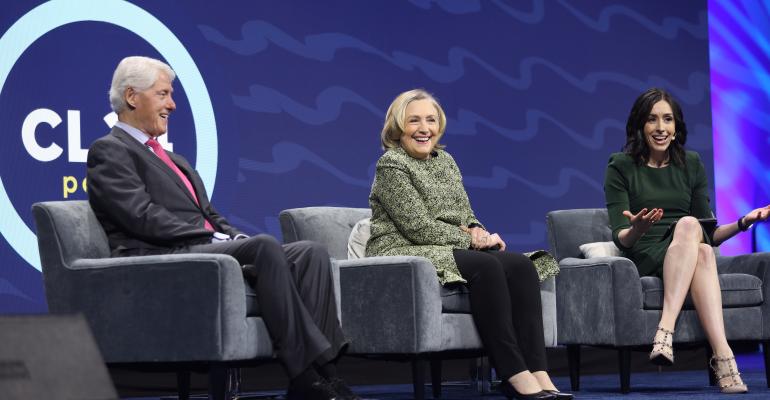As a professor at Columbia University’s School of International and Public Affairs, Hillary Clinton says this to her students on a regular basis: To make the best decisions, you must be able to hold multiple thoughts in your head at the same time—and often, those thoughts will be in conflict with each other.
For the record crowd of more than 4,200 planners and suppliers who came to San Diego January 7 to 10 for Professional Convention Management Association’s annual Convening Leaders conference, Clinton reiterated that idea but with an important addendum: Manage your energy and your schedule for each day so that you’re at your best when decisions must be made.
During a 45-minute conversation on the main stage that included her husband Bill—the 42nd President of the United States—and moderator Holly Ransom, Clinton spoke directly to the role that association-event planners play in the big picture. “The Covid pandemic made so many people feel isolated, and unscrupulous people took advantage of that” by using the internet to push out misinformation on many topics related to government activity as well as the business world, she said. That’s the reason why “coming together in person is so important to society” and why event planners’ responsibilities are significant.
Making Decisions with Big Consequences
Recounting the May 2011 operation by U.S. military forces that located and killed Osama Bin Laden in Pakistan, Hillary Clinton, who then was U.S. Secretary of State, noted that “it was such an emotionally fraught time for everyone involved. President Obama went around the table asked each of us our assessment of the situation. We did not have full agreement, and everyone was challenged before the President made his decision. It was exhausting for all of us, and it taught me a lot about the patience that’s needed for making important decisions: hearing each person out, asking for more information, re-evaluating everything as you go, and managing your energy and focus” to remain effective throughout the process.
Here, Bill Clinton chimed in with some advice of his own: The participants of a decision-making situation “have to respect each other, and not get irritated with those who disagree with them. Role-playing other people in the situation could help everyone better understand others’ perspectives without getting angry or finger-pointing or scapegoating.”
Regarding the role of event planners, Hillary Clinton said that “you make thousands of decisions every day, many of them unconscious. You need your energy to be high when making the conscious decisions. You have to know yourself,” including when you are most mentally alert. So, she said, it is important to set up your daily schedule to account for when you are best able to listen, absorb information, and ask questions, and also for when you are best able to reflect on all that information and come to a decision.
Even before the process begins, however, planners must deliver to their teams clear explanations of the various elements of complicated issues. In other words, said Clinton: Do not assume your team’s baseline knowledge about a situation, or else misunderstandings can happen regarding what information is needed to make a sound decision.





